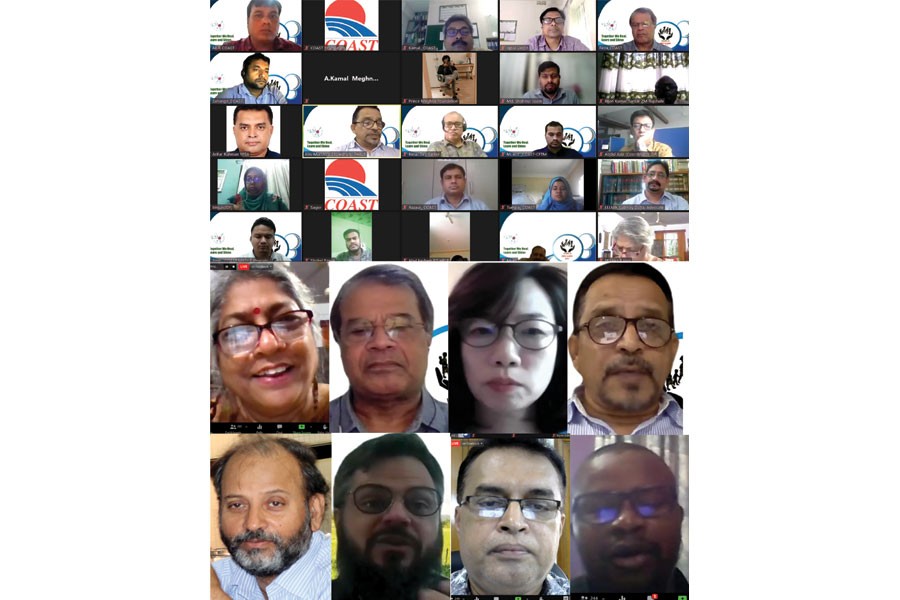‘Track Two Diplomacy’ needed for sustainable solution of Rohingya crisis
Social cohesion, environmental recovery need to be ensured until repatriation

Published :
Updated :

The ultimate solution to the Rohingya crisis is the sustainable solution, and to ensure that, track two diplomacy is needed for putting pressure on the Myanmar government.
Speakers during a webinar on Sunday organised by Cox’s Bazar CSO NGO Forum (CCNF) said this.
They also urged all stakeholders to ensure the human dignity of the Rohingya community, and social cohesion until the repatriation, says a statement.
On the occasion of World Refugee Day, CCNF, a network of 50 NGOs working in Cox’s Bazar organised the webinar title ‘World Refugee Day: Together We Heal, Learn and Shine’.
The webinar was jointly moderated by two co-chairs of CCNF Rezaul Karim Chowdhury, executive director COAST Foundation, and Abu Morshed Chowdhury, executive director-PHALS.
Arifur Rahman, chief executive YPSA, Bimal Chandra Dey Sarker, chief executive Mukti Cox’s Bazar, Abul Kashem, executive director of HELP Cox’s Bazar, Zahangir Alam, member secretary of CCNF, and assistant director of COAST Foundation placed specific interventions on behalf of the organisers.
Among others, Shireen Haq of Naripokkha, Gowhar Nayeem Waha of Disasater Forum, Manuel Moniz Pereira of IoM in Coxsbazar, Pius Mbaya Mulonzya of NGO Platform Coordinator, and Soo Jin Rhee, deputy representative, UNHCR spoke at the occasion.
Abu Murshed Chowdhury said Myanmar holds the main responsibility to ensure sustainable repatriation of the Rohingya people. International pressure is needed, to ensure international united actions to put pressure on Maynmar, along with UN initiative, government to government diplomacy and track two diplomacy is needed.
Abul Kashem said local farmers are suffering since the water level has been gone down as underground water is being used to supply water to the camps. The purification and supplying water from Naf rivers and Reju canals to both camps and local areas can also promote social cohesion.
Bimal Dey Sarker said youths should be involved with skill-based education so that they can ensure sustainable employment while they will back. We need to ensure certification and accreditation of the education of the camp.
Jahangir Alam said social cohesion is a must until repatriation. Arifur Rahman said trafficking is an organised crime. Many people including influential are trapping Rohingya people to be a victim of trafficking. We need to promote awareness of this.
Shireen Haq said, local people and local organisations were the very first responders, but that is why localisation of aid is a rational demand. Unfortunately, we can see very little development in ensuring localisation.
Gowhar Nayeem Wahra said groundwater exploration must be stopped immediately, rainwater harvesting can be a successful option in this regard. Instead of an LPG gas cylinder, a rice husk-based coking solution should be promoted. Establishing small-scale factories for this can be helpful in employment generation for the local people.
Manuel Moniz Pereira said total dependency on humanitarian support is not a sustainable solution. Demand-based economic cooperation and communication among the Rohingya and host communities need to be promoted.
Soo Jin Rhee said, it is unfortunate that, during the last 10 years, the number of refugees has been doubled. Bangladesh has opened the door for more than one million Rohingya, which is worth appreciated. Now, we need to ensure the dignity of the Rohingya people until the repatriation.
Rezaul Karim Chowdhury said that as the fund is decreasing for the Rohingya response, we need to think of maximum services with minimum expenditure.


 For all latest news, follow The Financial Express Google News channel.
For all latest news, follow The Financial Express Google News channel.